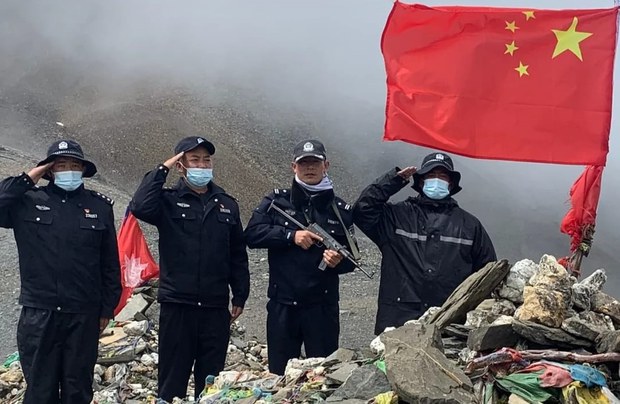Authorities in China’s Qinghai province are forcing Tibetan nomads to replace the prayer flags they set up near their camps with China’s national emblem in what critics see as an example of the government’s effort to wipe away Tibetan cultural and religious practices.
The campaign was launched at the beginning of the year in Matoe (in Chinese, Maduo) county in Qinghai’s Golog (Guoluo) Tibetan Autonomous Prefecture, a Tibetan living in exile told RFA, citing contacts in the region.
“Nomads living scattered around Matoe are being forced to attend political education sessions,” RFA’s source said, speaking on condition of anonymity. “And the Chinese government is putting up the national flag in places where Tibetans usually perform traditional religious ceremonies.
“They are also removing Tibetan prayer flags hung on the hilltops, saying they are not environmentally friendly, and are demolishing the furnaces used to perform smoke offerings used in purification ceremonies,” he said.
China’s campaign in Matoe follows the destruction of visible symbols of Tibetan culture and religious belief reported by sources in other Tibetan areas, including Tibet’s regional capital Lhasa, where China in November 2020 banned fragrant smoke from the burning of juniper boughs at the city’s iconic Jokhang Temple.
Also speaking to RFA, Pema Gyal — a researcher at London-based Tibet Watch — called China’s new drive in Matoe a politically motivated effort intended to “monitor and control the thoughts of local Tibetans.”
“There are huge concerns regarding how the Chinese government conducts these political education sessions for Tibetan nomads, forcing them to raise the Chinese flag and place portraits of Chinese Communist leaders in their homes,” Gyal said.
The destruction of prayer flags and the restrictions at the Jokhang and other religious sites signal a growing pattern of Chinese control over traditional Tibetan religious practice and increasing attempts by Beijing to recast Tibetan Buddhism as a Chinese faith, experts and observers say.
Formerly an independent nation, Tibet was invaded and incorporated into China by force 70 years ago.
Tibetans living in Tibet and in Tibetan areas of western Chinese provinces frequently complain of political, economic and religious discrimination as well as human rights abuses and say they fear Beijing is pursuing ever more aggressive policies aimed at eradicating their national and cultural identity.
Copyright © 1998-2020, RFA. Used with the permission of Radio Free Asia, 2025 M St. NW, Suite 300, Washington DC 20036.







